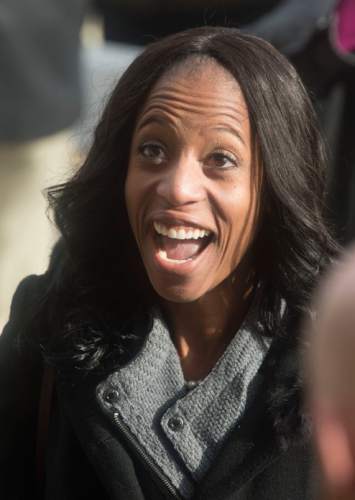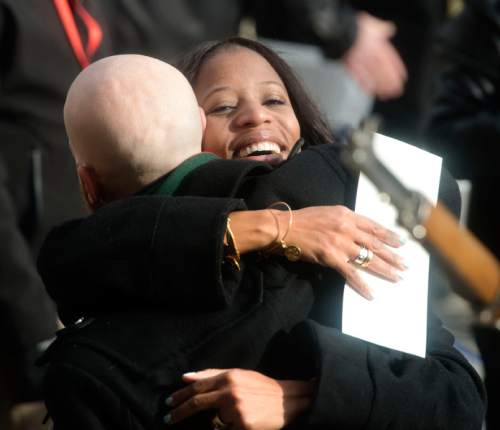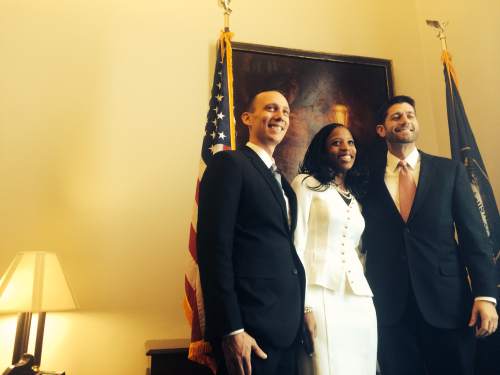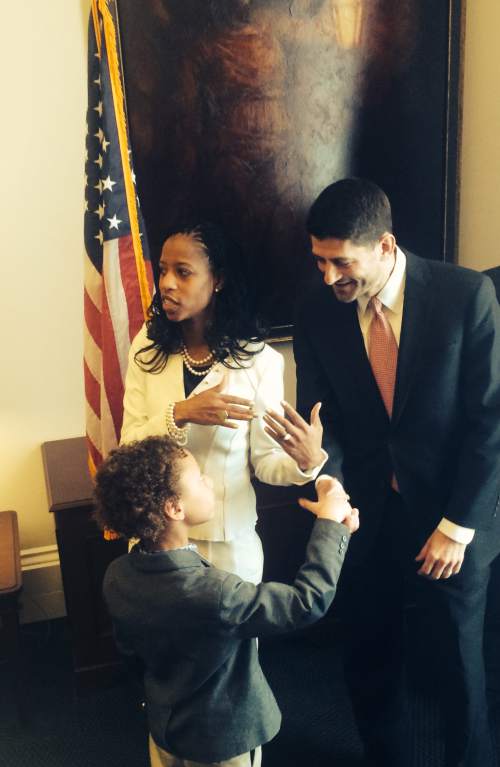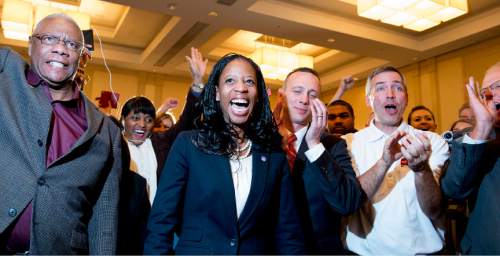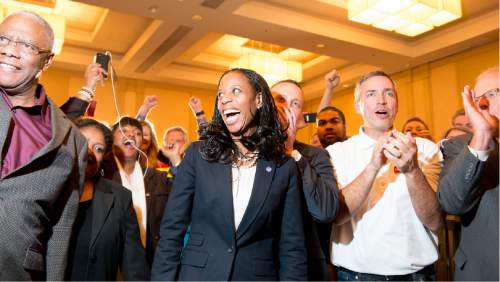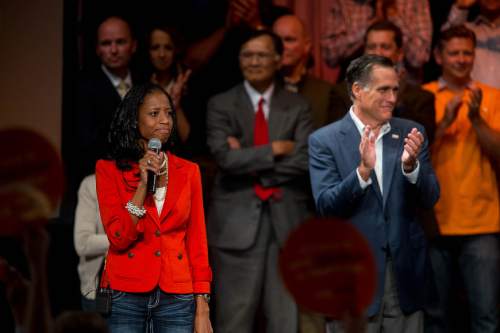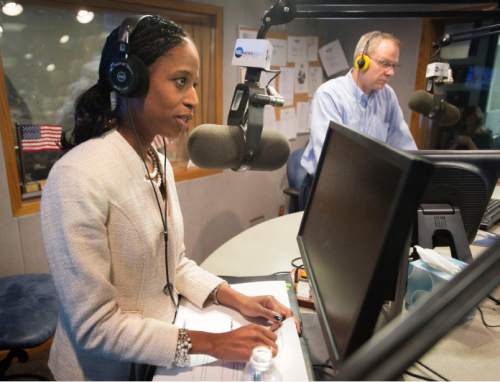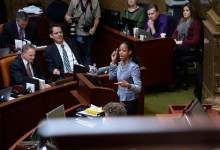This is an archived article that was published on sltrib.com in 2016, and information in the article may be outdated. It is provided only for personal research purposes and may not be reprinted.
Washington • Mia Love was thrust into office with big expectations.
The first black female Republican member of Congress stepped into Washington already with a national following, on the top of the invite list and craved as a talking head by the news media.
A year later, the Utah Republican remains a GOP star — though she has worked to keep a lower profile, turning down major television interviews and declining invitations to headline big fundraisers.
The low-key approach is "on purpose," she says, "because I wanted to work hard."
"I wanted people to know the work that I'm doing here," she adds. "This is not about me. This is about actually getting things done."
It took Love, the former mayor of Saratoga Springs, two tries to win her congressional seat, and she faces a likely rematch this year against Doug Owens with national Democrats already saying she's a top target.
Love says she has worked to stay in the trenches in her first months in office, arguing that if she's going to take time away from her family in Utah, she better make it count — a point she punctuated by showing a cellphone text from her daughter saying how proud she was of her mom's work in Washington.
In a Congress mired in gridlock, Love wasn't able to advance any legislation or make the big changes she wanted to the Congressional Black Caucus, but she did earn a spot on a select committee investigating the sale of tissue from aborted fetuses and dug into her assignment on the Financial Services Committee.
Love says she's a bit shocked when asked why she hasn't been more of a news-media darling.
"It's funny that would be a criticism," she says. "I think that it's a positive. It shows I'm less interested in politics and more interested in policies and getting things done here."
—
A friend in a high place • She also won a nice bonus when her mentor, Rep. Paul Ryan of Wisconsin, the 2012 Republican vice presidential candidate, rocketed to the top House job after Speaker John Boehner, R-Ohio, resigned.
Ryan continued to reach out to Love, she says, and even took her to dinner in mid-December amid a crush of last-minute legislative deals.
Ryan said in a statement that he has enjoyed working with Love.
"I remember my first year in the House, and I can say that, in a very short amount of time, she has become an invaluable member of our caucus," Ryan said. "She is a strong advocate for the people of Utah, and I'm excited to see her grow in her new role."
To observers, Love hit the sweet spot of being visible but not reaching for celebrity status.
"Certainly, she has not been as prominent in the press as some may have thought, but that isn't an indication of her not doing what really needs to be done during that first period in Congress," says Jason Perry, a former top aide to Gov. Gary Herbert and now director of the University of Utah's Hinckley Institute of Politics. "I'm not sure if her approach was to play to the press as much as it was to learn the ropes and learn what's happening in D.C."
The first year in Congress entails a serious learning curve, Perry adds, especially when it comes to learning what you can — and can't — do.
Love took a few lumps for that during her short tenure.
Months after she and her husband, Jason, attended the lavish White House Correspondents' Association Dinner, reporters pointed out that it appeared she had billed taxpayers for her flights and some expenses surrounding the event. Congressional rules forbid such charges, and Love said she would reimburse her office.
The issue arose again when reports surfaced that on another occasion, she had been reimbursed for two flights on consecutive days when she took only one flight. She again said she has paid back taxpayers.
Those issues are likely to come up in her re-election bid — in fact, Owens already sent out fundraising emails citing the news stories.
Love says she expects to be under a microscope, especially given her somewhat competitive district. She beat Owens by only 3 percentage points in 2014.
—
Angry white men caucus • "I do believe that there's a target on my back because of who I am. That's probably the biggest issue," Love says. "The fact that I don't just, ya know, fit into [Democrats'] narrative. I literally take that narrative apart."
To illustrate that point, Love says that during a debate on the House floor about a bill to ban abortions after 20 weeks of pregnancy, a Massachusetts member called the effort a ploy by the "caucus of angry white men."
"I wasn't asked to speak; I wasn't asked to do anything but I said, 'Look, I don't know if you've noticed, but I'm not angry, I'm not white and I'm not a male," Love says in an interview. "I'm a mother, I'm a Utahn, I'm an American who's disappointed we wouldn't advocate for children that can feel pain."
Actually, the comment Love referenced about the "caucus of angry, white men" came from a Maryland member in September during a debate about funding for Planned Parenthood, not during the May debate on the abortion ban. And Love didn't speak on the House floor — her office says she didn't make it to the floor in time — but she did record a video that was circulated online.
When it comes to the Congressional Black Caucus, Love says she brought a new element to the group that, until she joined, "had always been in agreement."
"They've never had anyone push up against those ideas," Love says.
"What's great about that is that you'll find in any group there are some people where it's about them. And then you'll find there are some people who say, 'Huh, maybe this will work.' "
Case in point: Love approached some fellow CBC members about her Flexibility to Innovate for College Affordability Act and was able to sign on Rep. Marcia Fudge, an Ohio Democrat and former chairwoman of the CBC.
Love, as she promised during her campaign, immediately joined the Congressional Black Caucus when she was sworn into office. She was the first Republican in several years in the caucus and remains the only one now.
The Utah congresswoman joined the caucus in a meeting with President Barack Obama in early 2015, and she later was selected to speak at a ceremony the president attended at the Capitol to honor the anniversary of the ratification of the 13th Amendment, which ended slavery.
CBC Chairman G.K. Butterfield, D-N.C., says that Love attends the caucus' meetings "sporadically" and he doesn't know her well, but that she has cultivated some good relationships with other members.
"She participates in the conversation, is not antagonistic, is constructive," Butterfield says in an interview. "So her participation has been constructive, I'll say that."
Fellow CBC member Rep. Hank Johnson, D-Ga., says Love's attitude toward the CBC is "remarkably" different than her 2012 campaign rhetoric in which she said she wanted to destroy the CBC.
"Mia Love has come into the CBC and endeared herself to many CBC members, including myself, and I'm impressed with her as a person," Johnson said outside of the House chamber last week. "I disagree with her politics. But I think she has gained the respect of many of the members of the CBC. ... She's strong in her beliefs but yet she is able to put those aside and deal with the members of the CBC individually and as fellow African-Americans."
—
Policy vs. politics • Rep. Rob Bishop, the most veteran of Utah's House members with 14 years in office, says that Love's first year was a success in that she was really intent on learning how Congress works. She could have played the publicity card, Bishop adds, but she didn't.
"I do know she's doing the right things to be a respected member and, to be honest, the others who are looking at her are realizing, 'OK, you could have been in the spotlight all the time and you decided to be really a hard worker,' " Bishop says. "She's earned a great deal of respect from her peers."
Love introduced five bills in 2015, dealing with banks, veteran benefits, college affordability and student loans, though none of them was voted on by the full House.
Bishop says that isn't a measure in which to put much stock.
"We don't get a lot accomplished as senior members around this place either," he says frankly.
Love, though, says she found success by working on individual cases, from immigration issues to veteran care and benefits to helping senior citizens having trouble with the government's red tape.
"The best part of the job," Love says, "is when a constituent comes into the office and says, 'I have this issue, can you help me?' and we're able to."
Love says she saw up close the problems with the federal government during her first year: how regulatory agencies, she says, have more power than she thought and how the administration can make rules that take a long time — if ever — to override.
What else has she learned in her first year?
"I've learned that I really do not like politics," she says, laughing.



